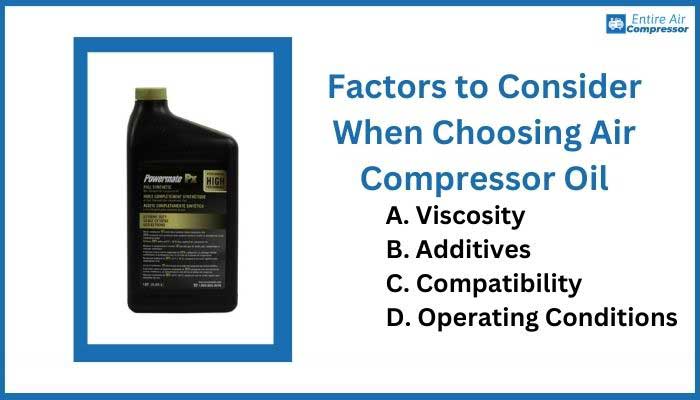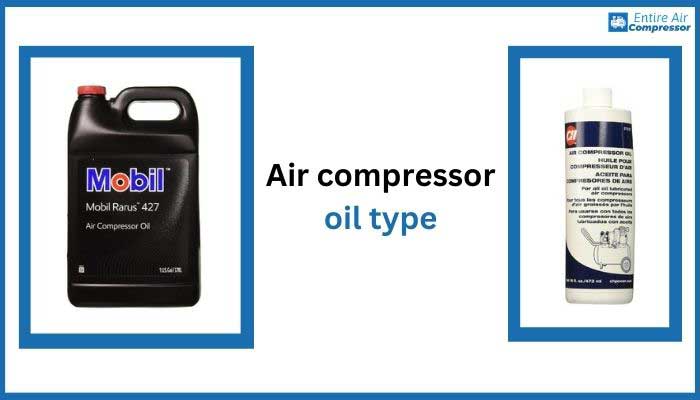Wondering which air compressor oil type is best suited for your compressor? Choosing the right oil is crucial for maintaining peak performance and extending the service life of your equipment. In this guide, we’ll explore the various types of air compressor oils, including mineral oil, synthetic oil, semi-synthetic oil, and food-grade air compressor oil.
From their characteristics and applications to the factors influencing your decision, we’ve got you covered. Discover the optimal oil for your compressor and ensure it runs smoothly in any environment.
Types of Air Compressor Oils
A. Mineral Oil
- Characteristics and Properties
- Wide Range: Mineral oils offer a broad operating temperature range suitable for various conditions.
- Oxidation Resistance: Discussing the oxidation resistance to highlight longevity.
- Suitable Applications
- Energy Consumption: Exploring how mineral oils can impact energy consumption in air compressors.
- Cooler Temperature: Highlighting the benefits in maintaining cooler temperatures during operation.
- Advantages and Disadvantages
- Resistance to Oxidation: Discussing the resistance to oxidation and its impact on maintenance costs.
- Accumulation of Carbon: Addressing potential issues like the accumulation of carbon and its consequences.
B. Synthetic Oil
- Key Features and Composition
- Energy Efficient: Exploring how synthetic air compressor oil contributes to energy efficiency.
- Resistance to Oxidation: Comparing oxidation resistance with mineral oils.
- Appropriate Applications
- Industrial Air Compressors: Emphasizing the suitability of synthetic oils for industrial air compressors.
- Ingersoll Rand: Mentioning compatibility with specific compressor brands.
- Pros and Cons
- Maintenance Costs: Discussing how synthetic compressor oil may impact maintenance costs.
- Water Separation: Addressing the efficiency in water separation.
C. Semi-Synthetic Oil
- Blend of Mineral and Synthetic Oils
- Optimal Performance: Discussing how the blend enhances performance.
- Resistance to Oxidation: Reiterating the importance of oxidation resistance.
- Performance Attributes
- Peak Performance: Highlighting how semi-synthetic oils contribute to peak performance.
- Piston Rings: Addressing compatibility with piston air compressors.
- Recommended Applications
- Cold Environments: Discussing the suitability for cold temperature conditions.
- Extreme Temperature: Addressing performance under extreme temperature variations.
D. Food-Grade Air Compressor Oil
- Importance in Specific Industries
- Regulatory Requirements: Highlighting the necessity in industries with strict regulations.
- Alternative for Air Compressor: Discussing its role as an alternative for specific air compressor applications.
- Compliance with Safety Regulations
- Auto-Ignition Temperatures: Addressing safety aspects related to auto-ignition temperatures.
- Cold Temperature: Discussing suitability in cold environments.
- Best Practices for Usage
- Weight Oil: Exploring considerations related to the weight of the oil.
- Premature Wear: Addressing factors that may lead to premature wear.
Factors to Consider When Choosing Air Compressor Oil


A. Viscosity
- Impact on Compressor Efficiency
- Grade of Oil: Explaining how viscosity affects compressor efficiency.
- Piston Air Compressor Oil: Addressing specific considerations for piston compressors.
- Matching Viscosity to Ambient Temperature
- Cold Temperature: Discussing considerations for cold temperature environments.
- Extreme Temperature: Addressing challenges in extreme temperature conditions.
B. Additives
- Functionality of Additives in Oil
- Additives in Air Compressor: Exploring common additives and their functions.
- Resistance to Oxidation: Reiterating the role of additives in oxidation resistance.
- Common Additives and Their Purposes
- Air Bubbles: Addressing how additives can prevent the formation of air bubbles.
- Cold Temperature: Discussing additives’ impact on performance in cold environments.
- Considerations for Specific Applications
- Air Compressor Oil Specifications: Exploring the importance of meeting specific compressor oil specifications.
- Air Compressor Usage: Discussing considerations for different types of air compressor usage.
C. Compatibility
- Ensuring Compatibility with Compressor Materials
- Types of Compressor Oil: Exploring compatibility with different compressor types.
- Industrial Air Compressors: Addressing considerations for industrial-grade compressors.
- Avoiding Oil-Related Issues
- Table of Compatibility: Providing a table highlighting compatible oils for various compressors.
- Alternatives for Air Compressor: Discussing options if specific oils are not compatible.
D. Operating Conditions
- Tailoring Oil Choice to the Compressor’s Operating Environment
- Peak Performance: Discussing how oil choice impacts the compressor’s peak performance.
- Resistance to Oxidation: Reiterating the importance of oxidation resistance in different operating conditions.
- Addressing Extreme Conditions
- Water Separation: Discussing challenges and solutions related to water separation.
- Alternative for Air Compressor: Addressing alternatives for extreme temperature conditions.
How to Change Air Compressor Oil
A. Frequency of Oil Changes
- Recommended Intervals
- Service Life: Explaining how recommended intervals contribute to the overall service life.
- Automatic Transmission Fluid: Addressing considerations for using automatic transmission fluid.
- Monitoring Signs for Oil Change
- Oil Consumption: Discussing signs that indicate the need for an oil change.
- Resistance to Oxidation: Reiterating the impact of oxidation on the frequency of changes.
B. Step-by-Step Guide
- Draining Old Oil
- Air Bubbles: Addressing potential issues like air bubbles during the draining process.
- Resistance to Oxidation: Discussing the importance of ensuring complete drainage.
- Choosing the Right Replacement Oil
- Standard Compressor Oil: Highlighting considerations when choosing a standard compressor oil.
- Additives in Air Compressor: Addressing the role of additives in the replacement oil.
- Refilling the Compressor
- Energy Consumption: Discussing how proper refilling impacts energy consumption.
- Resistance to Oxidation: Reiterating the importance of resistance to oxidation during the refilling process.
Conclusion on Air Compressor Oil Type
In conclusion, selecting the right air compressor oil is vital for the longevity and efficiency of your compressor. From mineral oils to synthetic blends, each type offers unique advantages. Consider factors such as viscosity, additives, compatibility, and operating conditions when making your choice. Follow recommended oil change intervals and proper procedures for optimal performance.
FAQs about Air Compressor Oil Type
Can I use any oil in my air compressor?
Addressing Common Misconceptions
- Table of Compatibility: Providing a table indicating compatible oils for various compressors.
- Alternatives for Air Compressor: Discussing alternatives if using any oil is not advisable.
How often should I change the oil in my air compressor?
Tailoring Oil Change Frequency to Usage
- Grade of Oil: Explaining how the grade of oil may impact change frequency.
- Resistance to Oxidation: Addressing factors that may accelerate the need for more frequent changes.
What happens if I use the wrong type of oil in my compressor?
Explaining Potential Consequences:
- Premature Wear: Discussing potential issues like premature wear.
- Additives in Air Compressor: Highlighting the role of additives in minimizing negative impacts.
Is it necessary to use food-grade oil in certain industries?
Highlighting Regulatory Requirements:
- Resistance to Oxidation: Discussing the importance of meeting regulatory requirements.
- Alternative for Air Compressor: Addressing alternatives if food-grade oil is not feasible.


Hello! I am fahim zaman. I am an expert of air compressor and working with it for a long time. I will make it easy to understand the problems of air compressor and fix it.


